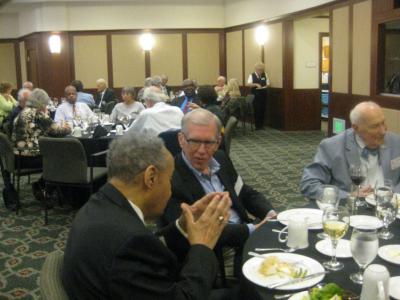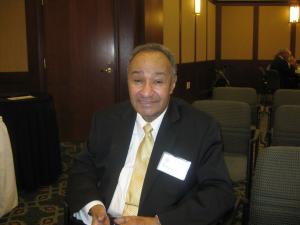Meeting Minutes of the 1459, September 13, 2017
Connecticut Academy of Arts and Sciences
Whitney Center, Hamden, Connecticut.
The President convened the formal meeting at 5:30 following a wine reception for the guest speaker, Professor Gregory Tignor, President of CAAS, who was replacing Professor Jacob Hacker who was seriously injured in a bicycle accident two days before the CAAS meeting.

One new member was inducted into the Academy:
Janet Reich, Language Pathologist
The President noted that flowers from the CAAS members were delivered to Professor Hacker’s
Residence.
The President’s talk: “How The Forgotten Green Book Helped America Prosper”
He began the talk by showing a photograph of his father’s Model-T Ford. He asked the audience how many remembered the radio show, “Car Talk?” There was substantial affirmative response from the audience. He proceeded to say that a good bit of his talk would be about car talk. He showed a photograph of his mother beside the old car that his father named: Henry.
He showed another photo of a later model car with a soft top and then turned to the story of a school bus that his father used to take students to visit historical sites including Gettysburg, PA. He raised the question as to how his father traveled so far with Black students during the Jim Crow era when Blacks were subjected to harsh discrimination. Professor Tignor traced the origin of the term “Jim Crow” to a white minstrel performer who found great favor among white people of that era.
Professor Tignor’s answer to the question of Black travel during the harsh Jim Crow era was to introduce the “Green Book” a guide to the Negro motorist. Vincent Green, a postal worker who used his union contacts to locate “safe” places for the Negro motorist, edited it. Green had substantial help and financial support from both the Ford Motor Company and from Standard Oil. The latter was the first American company to franchise Blacks who could operate shops that served all members of the motoring public. It was the “Green Book” that enabled Black travelers.
Car ownership crossed all economic lines among Black folk because that form of travel using the Green Book saved them from the Jim Crow indignities.

He then turned to his personal experience with the Green Book when he, as a teen, and his parents traveled from Washington, DC to Fort Benning, GA to watch his brother graduate from Ranger School. Along the way, they knew where to stop and stay, how to travel at night and find safe spots for fuel and rest. He joked about staying at Benedict College, an all-female Historically Black College where his parents locked him down tighter than Fort Knox.
He showed pages from the Green Book including CT that included several towns and from Washington State that encompassed most of the state. He also showed pages from the state of Oregon where there were few pages. His teenage conclusion was the Oregon was a state of equal opportunity.
In 2015, Professor Daniel Horowitz interviewed him for the book he was writing: “On the Cusp.” A review of Horowitz’ research showed that Oregon was not a free state for Blacks, but had a history of excluding of excluding Blacks going back to its original constitution.
• Rich Benjamin’s 2009 book Searching for Whitopia: An Improbable Journey to the Heart of White America.
• “Oregon today still exists as a white utopia in some respects. The state, much like so many others, is haunted by the residue of its past history .”Contrary to popular belief, discrimination or segregation do not require animus. They thrive even in the absence of prejudice or ill will. It’s common to have racism without racists.”
The Atlantic in 2016 says the same thing.
• https://www.theatlantic.com/business/archive/2016/07/racist-history-port…

1. The Green Book gave Blacks the undying will to travel for pleasure, to seek new and better lives, and increased educational opportunities.
2. It is a reminder that, even in the worst of times, in the midst of Jim Crow segregation, white people formed alliances with Blacks to make America prosper.
3. During a national government that seems unwilling to confront the evil ways of white supremacists, the Green Book illustrates that there is always a way forward toward keeping America great.
DISCUSSION
The discussion ranged far-reaching on the topic that President Tignor offered to the membership.
•”Contrary to popular belief, discrimination or segregation do not require animus. They thrive even in the absence of prejudice or ill will. It’s common to have racism without racists.”
Dinner was served at 7:15.
Minutes & photographs by Monica Aspianto